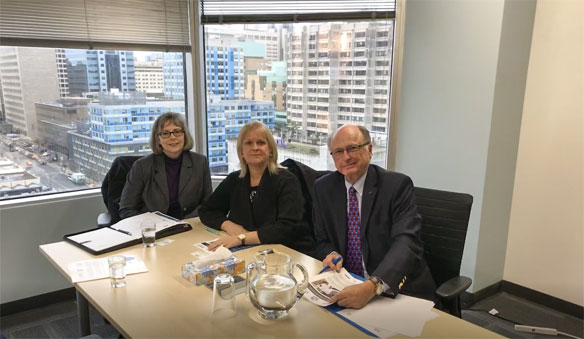
Making sure agents’ voices are heard
A conversation with Wendy Paradis, Association of Canadian Travel Agencies (ACTA)

BOB MOWAT
In the first part of a two-part interview with Canadian Travel Press, ACTA president, Wendy Paradis talks about how the association is working to advocate for its members as well as dealing with its own challenges during a global pandemic.
There has certainly been a lot of coverage about the impact of COVID-19 on all sectors of the travel and tourism industry, but not a lot has been reported about its impact on industry associations.
Can you talk about the kinds of challenges that ACTA has faced due to COVID-19? How has the pandemic affected the association’s staffing, its membership renewals, its revenues, etc.?
First, when the crisis hit we reviewed the ACTA 2020 business plan and made immediate changes based on the negative impact we were seeing on travel bookings and revenue – we knew we would have to have an intense focus on federal government lobbying. Our first priority was to ensure that the travel agency voice was heard loud and clear to secure aid to help travel agencies weather the crisis, as we all knew the impact was immediate and deep.
Challenges – We are a small team and we needed to leverage our resources as best we could to ensure maximum impact. The amount of ONGOING lobbying required to ensure travel agencies and travel industry remains a priority is intense. At approx. 24,000 travel agents across Canada, we are relatively small in size compared to other industries that are lobbying and have workers in the hundreds of thousands. Because the need is now so great from so many industries – we need to continuously reach out to ensure our voice is heard by multiple ministries at the federal level along with multiple ministries at the provincial level. Prioritization has been critical. It’s a lot.
The ACTA team: I’d like to give a shout out to the entire ACTA team – and in particular Heather Craig Peddie, VP, Advocacy and Industry Relations for her tireless efforts on the advocacy front. Our team worked long hours and often 7 days a week for the first couple of months of this crisis to ensure travel agencies and travel agents received as much financial aid as possible.
Membership renewals: 2020 renewals are very strong. The vast majority of members found a way to pay their ACTA membership fees which we are very thankful for in these very challenging times. However, not all travel agencies in Canada are ACTA members.
Our advocacy work is paid for by our travel agency members and yet it benefits all travel agencies – members and non-members. We ask that all travel agencies and travel agents who are not members to consider joining ACTA and if this is not possible at this time to contribute to our Advocacy Fund at https://acta.givecloud.co/give.
Any amount is appreciated and will help pay for the continued work of our professional Government Relations firm in Ottawa.

Heather Craig Peddie, VP, Advocacy and Industry Relations and the ACTA team have been working tirelessly during the crisis to make sure travel agencies and travel agents received as much financial aid as possible.
Like many travel businesses, our greatest concern from a financial perspective, is the unknown length of this crisis and the financial impact this will continue to have on our members and partners.
ACTA relies on travel agency member and travel partner fees for our sustainability and if they are hurting financially, this will have an impact on their ability to contribute ACTA and the work we do on their behalf.
February and March seem like such a long time ago, but I’m wondering if you could walk CTP’s readers through ACTA’s response to COVID-19. When did the association realized that there was big trouble coming for the industry and how did it formulate its plan to respond to it?
ACTA is part of the WTAAA and the Korean Travel Agency Association is a key Member. We started hearing a lot from them in late January and into February about the virus and the impact on their country and travel industry.
Although there were concerns throughout January and February, the crisis became surreal and unprecedented when the cruise advisories were announced in early March. By that time, our Government Relations firm in Ottawa was asking a lot of questions to their contacts in government in order to get “behind the scenes” insight and then ACTA hosted an emergency travel industry meeting on March 16 at the Marriott Airport Hotel.
Canadian Travel Industry leaders from ACTA, CATO, Travel Agencies, Tour Operators, Airlines, Travel Insurance and technology companies participated to brainstorm ideas to counter the swift and deep drop in travel bookings and develop tactics for the travel industry to work together through this crisis. It was during this meeting that the Federal Government announced the travel advisory “AVOID ALL NON-ESSENTIAL TRAVEL OUTSIDE OF CANADA”.
This was the day before March break.
Things moved very rapidly after that. ACTA started working intensely on gathering information from travel agencies, tour operators, and federal government. It became apparent very quickly that travel agencies would need immediate aid.
Our critical Issue – was when the full economy shut down, except essential services – now the vast majority of industries were affected. How do we keep the voice of the travel agent front and centre?
Continuing education: I would like to add that one thing we have been very active in is providing continuing education during this time for members and also offering informative webinars with subject matter experts in HR, Government relief programs & Finance, as well as professional development courses in many subjects that are ongoing. Many travel agents are taking advantage of this time to upgrade their skills and learning news things.
ACTA has been active in lobbying and advocating for its members. Maybe you can talk about some of the highlights of those efforts … and also some of the disappointments.
The need for financial aid was urgent. We met with the government on a daily basis via telephone for the first 12 week of the crisis to illustrate the impact and need. CEWS and CERB have been lifelines for travel agencies and the travel Industry.
At first the CEWS program was going to be a 10% subsidy, but with intense lobbying by ACTA and a number of other associations and businesses, the final outcome was 75%. We also focused on ensuring that independent contractors were not left behind and intensely lobbied on behalf of them on a daily basis to ensure they were included in CERB program.
Next week, ACTA president Wendy Paradis talks about the concerns of the association’s members, ACTA’s participation on the Canadian Tourism Roundtable and … what keeps her up a night in these difficult times. Don’t miss it.

Craig Peddie, Paradis and Pierre LePage
